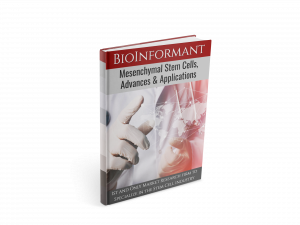Mesenchymal stem cells (MSCs) are multipotent cells that can differentiate into a variety of cell types, including but not limited to osteoblasts, chondrocytes, myocytes, and adipocytes. In addition to secreting factors that can stimulate tissue repair, MSCs can substantially alter their microenvironment, exerting effects that are both anti-inflammatory and anti-fibrotic. MSCs are advantageous over other stem cells types for a variety of reasons, including that they are immuno-privileged, making them an advantageous cell type for allogenic transplantation.
MSCs are an exceptionally promising tool for cell therapy, because of their unusual advantages, which include availability, expandability, transplantability, and ethical implications. Interest in therapeutic applications of human MSCs arises from their diverse ability to differentiate into a range of cell types, as well as their ability to migrate to sites of tissue injury/inflammation or tumor growth.
Naturally, a broad range of research products have been developed around MSCs and their differentiated cell types. Growing attention is also being given to manufacturing technologies to support commercial-scale production of MSCs. MSCs are well-suited for use in the exponential growth field of 3D printing, because of their capacity to form structural tissues.
Numerous market competitors are exploring commercialization strategies for MSC-derived extracellular vesicles (EVs) and exosomes, because these extracellular “packages” represent a novel strategy for accessing the therapeutic effects of stem cells without the risks of administering whole cells to patients.
MSCs are an intriguing tool for the treatment of complications related to COVID-19 as well. This is because MSCs exert powerful immunomodulatory effects when administered intravenously. Potential mechanisms of action include improving the lung microenvironment, inhibiting immune system over-activation, promoting tissue repair, protecting lung alveoli epithelial cells, preventing pulmonary fibrosis, and improving lung function.
Finally, gene editing of MSCs for overexpressing antitumor genes or therapeutic factors is broadening their application.
MSCs, the Leading Stem Cell Type Being Used in Regenerative Medicine Today
As the most common stem cell type being used within regenerative medicine today, there is vast potential for growth within the MSC market. There are more than one-hundred thousand scientific publications published about MSCs, as well over 1,100 MSC clinical trials underway worldwide. Current “hotspots” for MSC clinical trials include the U.S., E.U., China, Middle East, and South Korea. While countless early-stage MSC trials have demonstrated safety and efficacy, only a small number of MSC products have reached commercialization, indicating that the therapeutic market for MSCs remains early-stage.
Population aging and an increasing prevalence of chronic disease are also driving interest in MSC-based therapies. Furthermore, Google Trend data reveals that MSC searches are more than twice as common as any other stem cell type. The demand for MSCs and MSC-related research products have surged in recent years, with nearly a hundred market competitors now developing products/services, therapies, and manufacturing technologies specific to MSCs. Within this ever-changing landscape, having a thorough understanding of the market competition and their relative strengths and weaknesses is essential.
The Global Market for MSCs
To analyze this rapidly advancing market sector, BioInformant released a February 2021 global strategic report titled, “Mesenchymal Stem Cells – Advances & Applications, 2021.” It details the activities of 98 leading MSC companies, well as presents comprehensive market size figures for the global MSC market. Segmented by geography and business segment, these figures are accompanied by five-year forecasts through 2027.
The main objectives of the report are to provide the reader with the following details:
- Market size determination for the global MSC market, segmented by geography and business segment
- Five-year forecasts for the global MSC market
- Details of the product candidates being developed by MSC companies
- MSC market trends, opportunities, risks, and competitive dynamics
- Major diseases addressed by MSCs in the ongoing clinical trials
- Cost of manufacturing autologous and allogeneic MSCs
- Consumption of MSCs for academic research, clinical trials, product development, and exosome production
- Trend rate data for MSC scientific publications
- Rates, quantities, geographic locations, and types of MSC clinical trials
- Types and sources of MSC industry funding
- Recent business developments related to MSCs
- MSC-based products with marketing approval and the companies commercializing them
- Currently marketed MSC-based bone matrices
- Pricing comparison of MSC-based products with marketing approval
- Emerging applications for MSCs, including genetic modification, 3D bioprinting, clean meat production and cosmeceuticals
- Company profiles for 98 MSC market competitors, including their proprietary technologies and products/services under development
- And so much more
To analyze and track the rapidly evolving stem cell sector, BioInformant conducts interviews with prominent executives from across the field.
To assess MSC market dynamics, BioInformant interviewed representatives from Cynata Therapeutics (first company to bring a iPSC-derived MSC therapeutic product into a clinical trial), RoosterBio (specializes in manufacturing tens of billions of MSCs in suspension bioreactors), Celularity, Inc. (developing MSC therapies from the post-partum human placenta), Pluristem Therapeutics (commercializing placenta-derived mesenchymal-like adherent stromal cells in late-stage clinical trials), BioEden (leading company preserving MSCs derived from dental tissues), Regenexx (world’s leading provider of MSC therapies for orthopedic applications), and numerous others.
With the competitive nature of this global market, you do not have the time to do the research. Claim this recently released report to become immediately informed, without sacrificing hours of unnecessary research or missing critical opportunities.
BioInformant’s Expertise in Stem Cell Markets
With an online readership of nearly one million viewers per year, BioInformant is a U.S. market research firm with 15 years of experience. As the first and only market research firm to specialize in the stem cell industry, BioInformant research has been cited by the Wall Street Journal, Xconomy, and Vogue Magazine. Founded in 2006 and headquartered in Washington, DC, BioInformant is strategically positioned to be near the National Institutes of Health (NIH), the U.S. FDA, the Maryland Biotech Corridor, and policy makers on Capitol Hill.
In addition to leveraging an experienced team of analysts, BioInformant’s has unparalleled access to key opinion leaders (KOLs) from across the stem cell sector. As the first and only market research firm to specialize in the stem cell industry, BioInformant is your trusted leader in stem cell industry data. The content within this report was compiled using a diverse range of sources, as described in this Research Methodology.



















Tell Us What You Think!